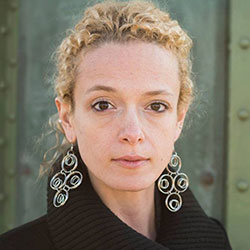Critical Commentary
Reviews for Green Horses on the Walls by Cristina A. Bejan
"'Nothing prepared me for island life,' Cristina A. Bejan notes in a memorable poem of exile. The island of poetry has always been with her, a physical and spiritual island composed of people she loves or not, the dailiness of a lived and detailed life in her country of origin, the languages that express them. These poems infuse the English language with the pleasures of a world I loved surrendering to. She is a poet through and through, born that way, and generously ours now."
-Andrei Codrescu, author of No Time like Now: New Poems (Pitt Poetry Series, 2019)
"Cristina A. Bejan's collection of poetry Green Horses on the Walls (Cai Verzi pe Pereți) is a sensitive and vibrant radiography of the immigrant inbetweeness: the soul-searching negotiation between images/words/values immersed in her father's native country, Romania, and the daily discoveries made by the poet as a young American woman in the #MeToo era. This lyrical coming-of-age puzzle takes us on a poignant journey into the future via the past, across geographical and emotional borders. Let's go!"
-Saviana Stanescu, author of Aliens with Extraordinary Skills, Google Me, etc.
"Cristina A. Bejan's collection Green Horses on the Walls is a raw and startling odyssey of a quivering self, torn between cultures, languages, tormented family histories, wrenching traumas and a fierce drive to heal and transform experience into redemptive and empowering art. The poetic voice bursts with uncompromising honesty, and hints of nostalgia for luscious and disheveled landscapes such as the restless streets and people of Bucharest, as it also traverses frightening landscapes of a memory painfully replete with harrowing moments of sexual violence and sinister mental health wards. Experience is channeled in an effervescent and gutsy linguistic orchestration deliciously sprinkled with polyglossia, at times heartbreaking at other times suspenseful and yet at other times luminous and whimsical. A poetic tour de force of cathartic story telling!"
-Domnica Radulescu, award-winning author of Train to Trieste and Country of Red Azaleas
"Bejan's work traverses all matters of the heart: true love, mental health, home, country, and politics. Her careful attention to her family's history and her own diaspora creates very intimate moments inside a larger artistic and political conversation. Her translations are fresh; energetic; and her bilingual work carves out a space for her Romanian-American identity. The raw emotion pulls you into this collection. Visit the mind of Bejan through her images, as she reckons with her experiences and family history."
-Suzanne Richardson, author of The Softest Part of A Woman is A Wound
"Cristina A. Bejan's poetry has the urgency of Clint Smith's spoken word rhythms from his Counting Descent, the humor of Milan Kundera's The Joke, and the honesty of Naomi Shihab Nye's Voices in the Air. Cristina Bejan's poetry sounds as if the Romanian painter Adrian Ghenie is having coffee with Walt Whitman. Poised at the intersection between languages, cultures, and histories, Cristina Bejan can say with confidence, "And when it feels like too much--which it often does / I know I can go home / And how many people can say that?". Her father advises her to "Put it under the mattress / The money / The truth / The pain," but Cristina Bejan knows better. Green Horses on the Wallis part memoir, part testimony: poetry for our times, when we hold human beings in cages and tear their children away from their arms."
- Lucia Cherciu, author of Train Ride to Bucharest (Sheep Meadow Press, 2017) and Edible Flowers(Main Street Rag, 2015)
"Bejan is a Romanian-American poet-survivor--this collection astounds the reader with its overwhelming earnestness. The poems display a resistance to narrative, while still unavoidably relying on it, as they illustrate fragments of a life both halted and propelled by the violence of immigration, communism, mental health issues, and sexual assault. The poems together speak about an equilibrium, a way to survive trauma by finding an outlet through which to recreate oneself."
- Roxana Cazan, Indiana Review


